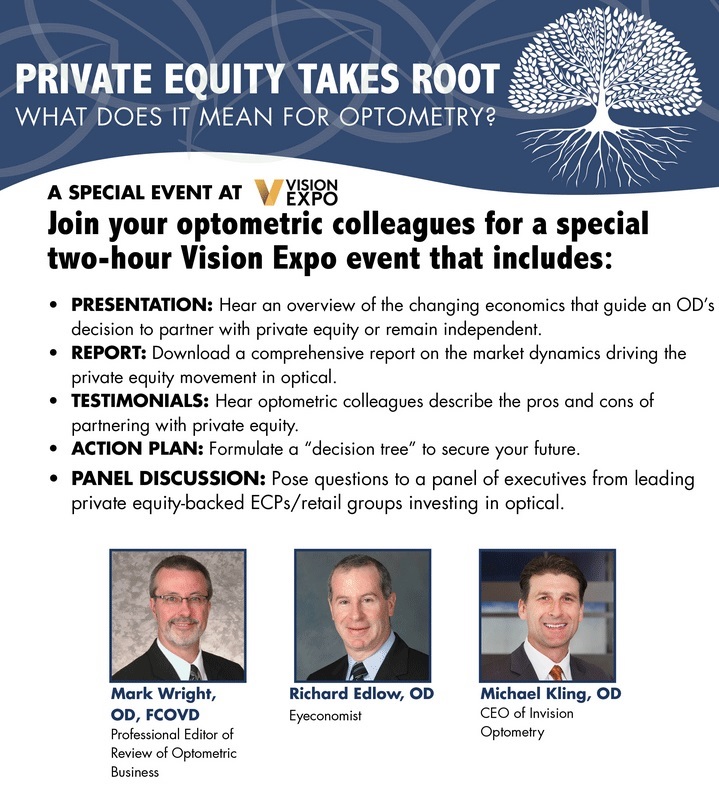By Chad Fleming, OD, FAAO

Sept. 19, 2018
Selling to private equity offers advantages, including a buyer with deep pockets, but there are drawbacks. For me, those drawbacks have been enough to keep me from saying yes to the offers I have received to sell to PE firms.
I have been approached twice to sell to PE. Once was to sell and then run the PE firm’s eyecare “hub” in my region. The pitch has been both from PE directly, almost like a “headhunter,” but also from ODs within the PE firm who are the “finders” of practices, and also from my network of ODs saying they have someone who I would be interested in talking to.
We were a two-location, five-doctor practice when private equity approached us, and we are now a four-location, seven-doctor, 40-staff practice in a 600,000 population metro area. Our practice is more than 70 years old.
The Pitch You May Hear
PE offers have been presented to me multiple ways. They typically drop a line about how their 10-15x EBITDA deal pays you much more than you could typically get (this is only true if you have a very high profit margin).
They also present selling to PE as a form of network marketing or a pyramid structure. If you are one of the early ones into the firm, then you can get other offices under you through buyouts that you can then, in turn, make money from. Some pitches also try to instill fear in a practice owner by asking, “Who’s going to buy you out?”
My typical response is, tell me more. These conversations are an educational process, and I would never want to say that I would never sell to a PE company; I’m just, as yet, unable to see the holistic benefits of selling to PE, both personally and for our patients.
Good Only for the Short-Term
The deals haven’t been right for my practice because they are financially attractive upfront, but not long-term attractive. PE has the cash to make a nice buyout if finances were all we were concerned about, but we’re also concerned about our patients. We want greater assurances that patient care wouldn’t suffer when the business owner becomes a large conglomerate.
As the CEO of our practice, I interact personally with patients whose needs are not being met or who have complaints. Our commitment to patient loyalty hinges on personalized, face-to-face service. Many PE deals look to me like large chain-business operations that wear the mask of private practice.
Also, any investor can see that what they are offering upfront pales in comparison to the profits that you benefit from over the years. Some of the PE firms want the current business owner (the OD) to continue to run the office. If I’m going to run the office in any capacity I want the OD shareholders and myself to be the beneficiaries, plus I want to pick what is best for patients, which is not always what is best for the bottom line.
A great disadvantage of selling to PE is the loss of a great dividend-paying investment. If anyone has rental property where they have enjoyed the benefits of a great renter, they understand that an optometry practice can, and should be, a great investment in paying dividends/profits. Even at 1-1.5x revenue, after five years, who is ahead? The one who sold or the one who still owns? I would argue the one who still owns.
Loss of Freedom as a Business Owner
Losing the freedom to be your own boss is the biggest disadvantage of selling to PE. I have thoroughly enjoyed getting to make decisions with our team, and do the right thing for the patient, even when it costs me. For example, I have refunded a pair of glasses 100 percent, and lost money on the deal. The funny thing is, I smiled the whole time making the decision because I knew it was the best decision for the patient–and the practice long-term. The result is a patient for life, along with every person they know because they see that we put their needs before our own.
Keep an Open Mind
If I were entrusting my practice to an individual, associated with a PE firm, whom I knew, based on experience, would take care of my patients as a first priority, I would consider selling to PE. I’m not indicating that PE does not care for patients; I’m only saying that it is much more difficult to organically grow the practice through patient care when the leader of the practice is not personally involved day in and day out.
I would also consider selling my practice to PE if I was ready to retire and I could not find anyone to buy my practice. However, I would first look very hard to find an OD like myself, and give them the opportunity, even if it meant me helping them for a couple of years.
PE is an option for me, but not a first option.
Is selling to private equity a viable option for you? Have you been approached about selling your practice? What was your response to that offer? What would it take for you to sell to PE?
You may also be interested in these articles:
The Secret to Dividing Management Responsibilities in Multi-Partner Practices
Does Your Practice Need a Corporate-Organizational Structure?
Associate OD Compensation: Set a Competitive Salary with a Revenue Percentage System
 Chad Fleming, OD, FAAO, is a partner with Wichita Optometry, P. A. in Wichita, Kan. To contact: chad@optometryceo.com
Chad Fleming, OD, FAAO, is a partner with Wichita Optometry, P. A. in Wichita, Kan. To contact: chad@optometryceo.com


























